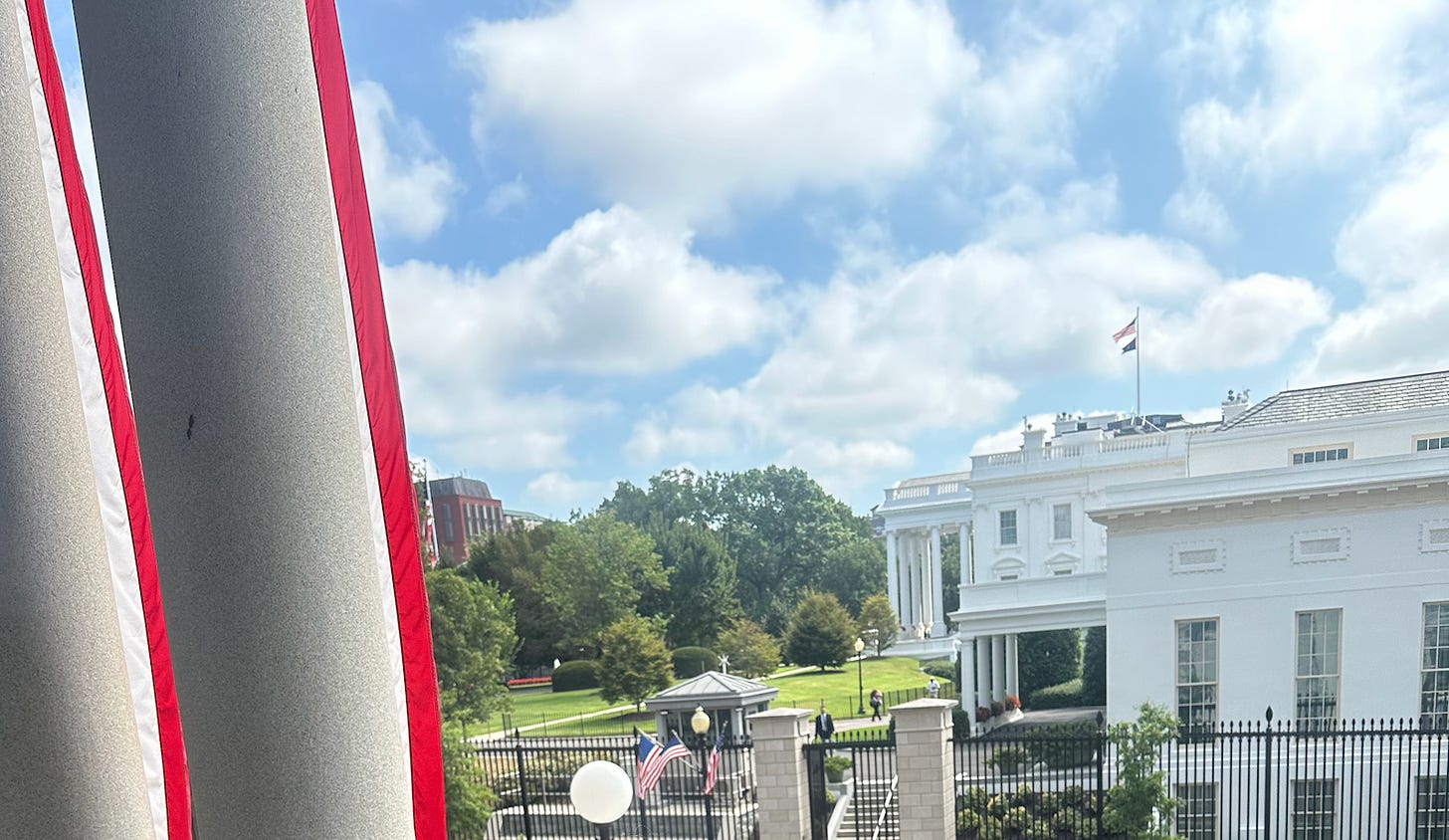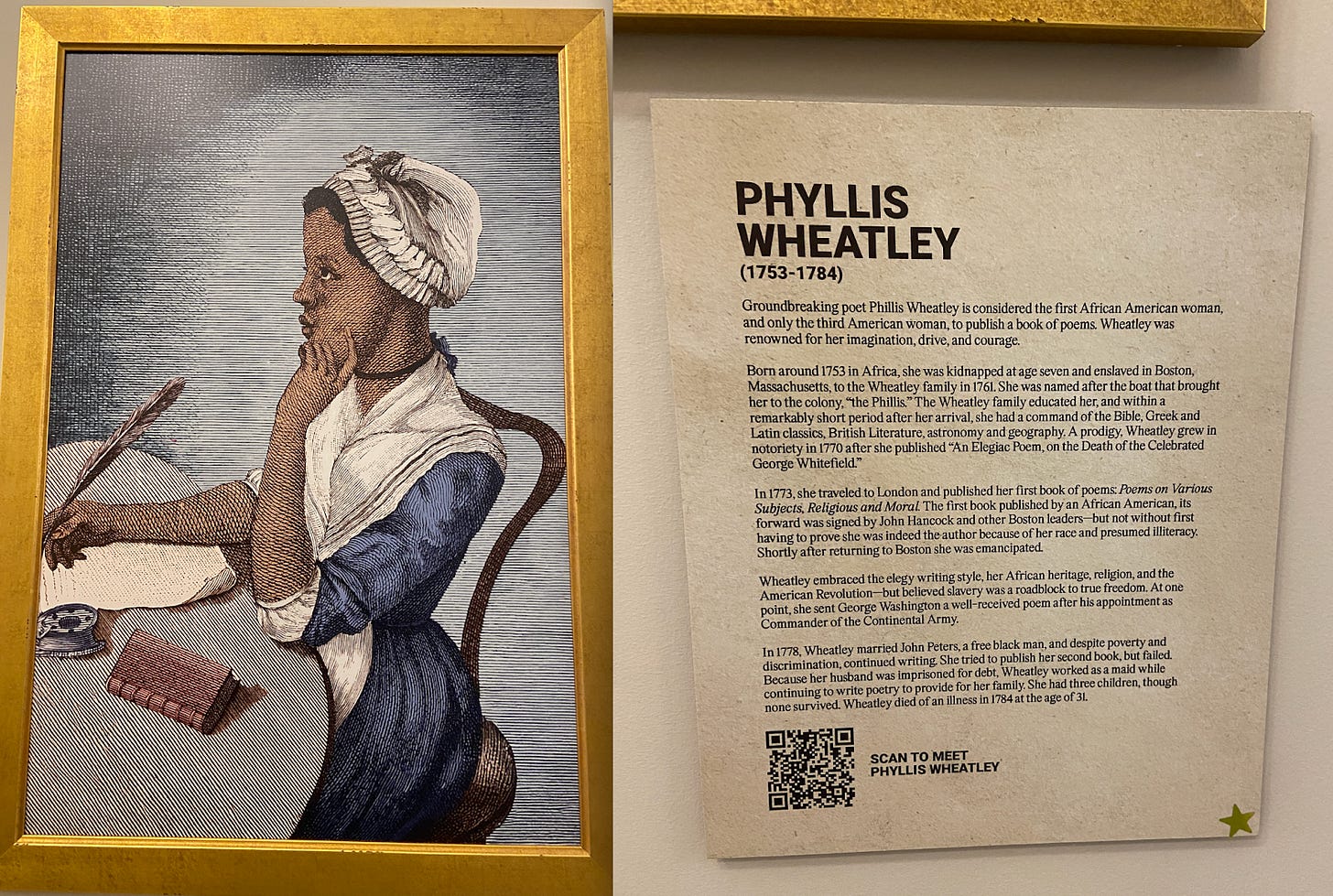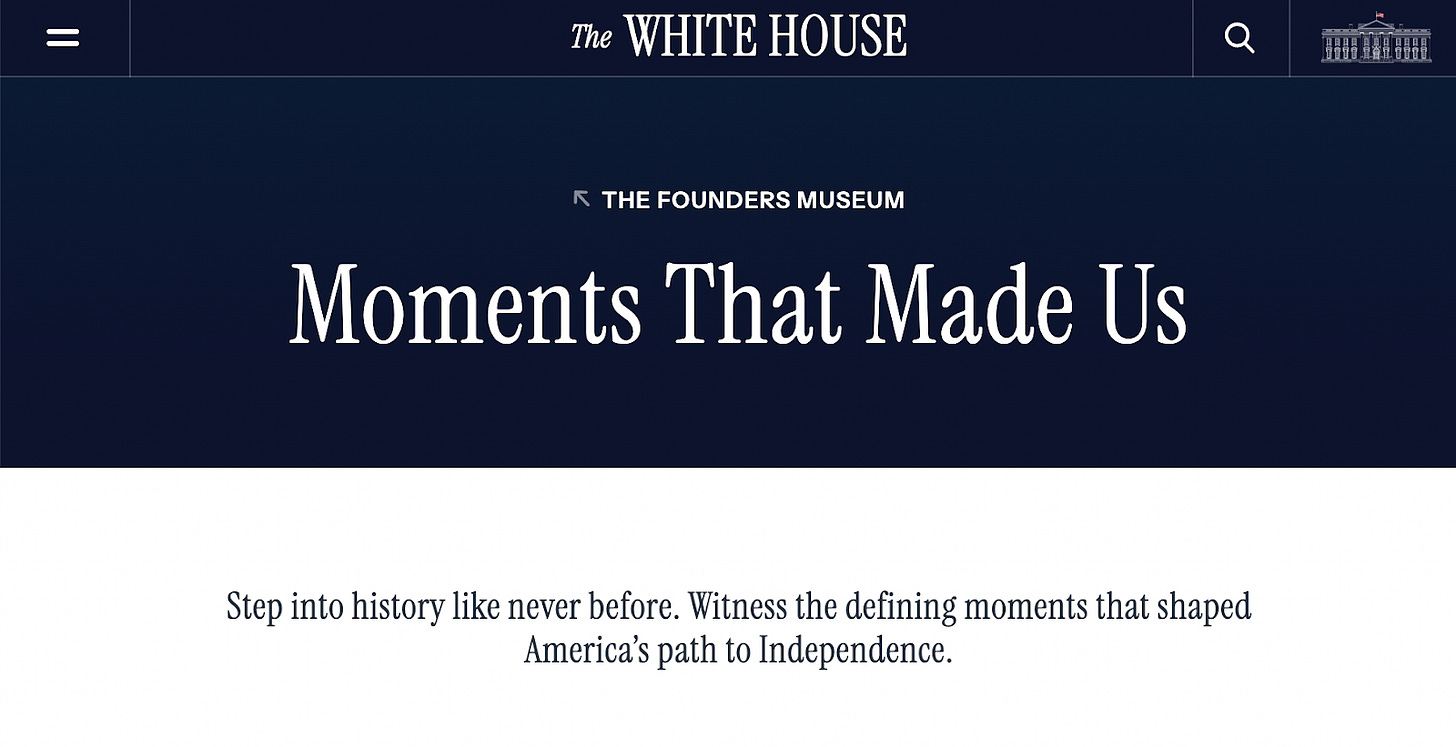America: Still Beautiful
And Innovative to Boot
Tech and Tools for 250
Ever commented, “If only walls could talk”? At the White House this week, that phrase came to life — literally — in The Road to Liberty, a phenomenal new exhibit that uses cutting-edge technology to bring the men, women, and moments that forged the United States vividly into the present.
One long hallway in the Old Executive Office Building is lined with portraits of the 56 signers of the Declaration of Independence. A quick scan of a QR code beside each portrait unlocks their voices, faces, and stories. Suddenly, John Penn of North Carolina is speaking directly to you:
“I’m John Penn, farmer’s son, lawyer by willpower and signer from North Carolina. I wasn’t bred for politics or born into privilege. I had two years of school, a bit of land, and not much drive. Then my father died, and everything changed. The farm, the family — all on me. So I turned to the one thing I hadn’t tried — learning… I read until my eyes ached. Three years later I rode into court as a licensed attorney.”
His story — and that of every other signer — unfolds in first-person, reminding us that America’s founding was shaped by people of grit, sacrifice, and vision. And it’s not just the men: the hallways reflecting more from the Founder’s Museum also feature remarkable women such as Betsy Ross, who stitched the first American flag, and Phillis Wheatley, the enslaved poet whose words helped shape the cause of liberty.
A collaboration of PragerU (which has tons of rich materials) and the U.S. Department of Education, it’s all part of the lead-up to America’s 250th birthday — and it’s more than a history lesson. It’s a fusion of storytelling, technology, and interactive learning that makes the past impossible to ignore and harder still to forget.
And as new stories come online in time for the back-to-school season, the project is arriving at a moment when the need for engaging, fact-based civic education could not be more urgent. That’s why tools like Constitution 101, the free online course from the National Constitution Center and Khan Academy, are so valuable — giving students, teachers, and lifelong learners an expert tour through the founding documents, their history, and their enduring role in American life.
Which brings us to this school year — one unlike any other.
A Back-to-School Season Like No Other
This school year offers not only a historic occasion to teach students about their country — it’s a critical one.
Since 1998, civics proficiency among U.S. eighth graders has barely budged. Only 22% score at or above Proficient, while 31% remain Below Basic. One-third can’t describe how government works, and fewer than half understand the U.S. electoral system. College students fare little better: barely a quarter know the Vice President presides over the Senate or that the 13th Amendment ended slavery, and many wrongly think the President can declare war. Among adults, more than 70% fail a basic civics quiz, only half can name the branch that makes laws, and just a quarter feel confident explaining how government works.
This is also the first school year in which artificial intelligence is reaching critical mass in classrooms. The rise of AI in K–12 education has accelerated at an unprecedented pace, with companies, products, and services moving from pilot programs to everyday tools. Districts are adopting AI-powered tutoring platforms, grading assistants, and personalized learning systems at record speed, while edtech vendors race to integrate generative AI into curriculum planning, assessment, and even special education support. What began as cautious experimentation has become a full-scale shift, as schools seek to harness AI’s potential to close learning gaps, reduce teacher workloads, and deliver tailored instruction — even as debates about data privacy, equity, and the role of human educators intensify.
On the heels of a new Executive Order and the Presidential AI Challenge, the Trump Administration is rallying the technology sector to develop responsible AI tools and “demystify this technology and prepare America’s students to be confident participants in the AI-assisted workforce, propelling our Nation to new heights of scientific innovation and economic achievement.”
“The Presidential AI Challenge seeks to inspire young people and educators to create AI-based innovative solutions to community challenges while fostering AI interest and competency. Students and educators of all backgrounds and expertise are encouraged to participate and ignite a new spirit of innovation as we celebrate 250 years of independence and look forward to the next 250 years.”
Bringing together the story of our nation’s first innovators with today’s most transformational innovation is not just smart — it’s the right recipe to advance learning at every level.
Requiescat in Pace, Ed Feulner.
It’s not often that a funeral Mass ends with America the Beautiful, but it was fitting for the man we gathered to honor. Edwin J. Feulner was a patriot, an “eternal optimist,” and a visionary. He co-founded The Heritage Foundation and served as its president for 45 years. He is remembered for many things—but for me, he was a source of inspiration. His simple idea—that policy papers for Capitol Hill should be so concise and clear that lawmakers would actually read them—was revolutionary in a town that believed more paper was better.
When I joined Heritage to inaugurate its education policy work, I quickly learned that perfecting the “art” of writing for policymakers, political actors, and the media was both ongoing and formative. For four years in the domestic policy shop, I endured thousands of edits and red marks. The purpose of that pain became clear when I started CER: brevity and clarity were essential to growing influence.
While that technocratic skill was valuable, it was Ed’s deep involvement in the work that left the greatest mark—especially in Heritage’s early years. He knew what each of us was working on, was quick with encouragement or challenge, and took every communication with every Heritage member or supporter seriously. So seriously, in fact, that I was summoned to the president’s office a few times—always a jarring experience.
One meeting in particular stands out. After receiving a call from Dr. Milton Friedman—whose view on a matter I strongly disagreed with—Ed called me in.
“Ms. Allen, do you know who Milton Friedman is?”
“Yes, Dr. Feulner, I do.”
“Did you actually tell Dr. Friedman that he was wrong?”
“Well, he is,” I replied.
Friedman had called after reading our newsletter celebrating charter school progress. His sharp message?: “Charter schools are the palliative to reform.” He meant that charters might ease the pain of a broken system without curing it. I told him charters were the only politically viable, scalable reform available. They created competition, proved that families could choose, and built the infrastructure for deeper change and the excellence that comes when individuals are truly free to choose, as he argued in his famous book.
At the time, I didn’t fully grasp how important Dr. Friedman was, though I certainly didn’t say that. Ed agreed with me but persuasively suggested that next time someone of Friedman’s stature called, I might soften my response—or at least delay it until further reflection. Good advice, all around.
As I left, he simply said, “Onward!”— his signature sign-off.
Years later, Friedman told me I was right: charter schools had helped pave the way toward broader education freedom. Ed was a big part of helping conservatives understand that, as he powered ahead to ensure the Heritage team play a leading role in advocating for and shaping the nation’s best school choice laws—and encouraged me to build my own organization to fuel the same.
He was also a visionary for new technologies. For a time, I reported directly to him and National Review founder William F. Buckley Jr., managing the development of the first online communications portal for conservatives—Townhall—which today, thanks to his original leadership, is a major media outlet.
Always ready with advice and generous with his time, this intellectual, strong, thoughtful and optimistic man contributed directly to sustaining a free society, protecting individual liberty, and fostering thousands of new ideas and strong leaders. If you don’t know him, take a moment to search his writings and history. No matter your political leanings, you won’t be disappointed. God Bless you, Ed.
The above story is apropos of the tag line for the Founder’s Museum, “Moments that “made” us.” Here’s 🥂 to never forgetting any of them - Jeanne



